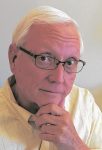 Even though a career newspaperman can’t avoid being exposed to life’s unpleasant realities, I’d be the first to admit that I seem to have gone out of my way to sidestep thinking about that ultimate moment of realization, the one where we finally come face-to-face with the limits of our mortality.
Even though a career newspaperman can’t avoid being exposed to life’s unpleasant realities, I’d be the first to admit that I seem to have gone out of my way to sidestep thinking about that ultimate moment of realization, the one where we finally come face-to-face with the limits of our mortality.
I was thrown into that situation recently when a member of our extended family started the long, strenuous slide toward the finality of life.
It all began a year ago in May, when the effects of a near lifetime of smoking raised the specter of lung cancer and a destiny that appeared to justify little hope for survival.
And so it went for the next 15 months, a slow but nonetheless inexorable downhill slide toward inevitability. For her, for all of us, the upside was her ability to remain in the comfort of her own home, purposely without the purportedly excruciating use of what we knew would likely be the miserable aftermath of treatment by chemotherapy and radiation.
The signs of illness were rather innocuous in the beginning. In fact, we wondered if the diagnosis of Stage IV lung cancer had really been accurate. Did we think she might actually recover? To be truthful, I’m sure we did, despite the fear that most of us must have known we were probably wrong.
But then the signs of decline began to show themselves more visibly: harder to leave the house, harder to prepare meals, harder to muster the remnants of her typical good humor as a way we assumed was designed to help us, her Arizona family, not worry when she struggled to breathe.
Each day, the signs became more difficult to ignore. That’s the way things work when you see someone every day as an illness progresses. To those who visited her less frequently, however, the difference became more apparent.
Did we think it was time to consider assisted living—that is, in a place where trained staff would be available 24 hours a day?
That was when Kay Fisher came onto the scene.
Kay, our onetime neighbor of many years, had built considerable experience in helping families find housing, either temporary or long- term, that would be affordable, convenient for family visits and, most importantly, able to demonstrate a history of professional, loving care— the kind that somehow could help dispel worries about the dreaded move to an institutional sort of environment.
That, as it turned out, was one of the areas in which Kay truly proved her worth, coupled with her knowledge of what can be a complex, many layered labyrinth of end-of-life care.

Next to become involved in the regimen of care was Hospice of the Valley, which proved itself to employ a highly skilled, highly dedicated staff of nurses and social workers, each one of whom possessed, to us at least, an almost unimaginable competency in a niche of care that, we all agreed, requires a very special person indeed.
Prior to the time we knew that assisted living likely would be needed, we visited at least 10 possible locations, each with its own plusses and minuses.
What seemed consistent at nearly all of them was the readily evident atmosphere of caring among staff members, many of Filipino origin.
The location we settled on, one of several operated in the Valley by Maria Remitio and her family, proved to have been an inspired pick.
In fact, based on our own experience and on the letters from families posted on a huge hallway board in the five- or six-bedroom home, it appeared that previous guests had felt similarly thankful for the care their loved ones had received.
The two fulltime resident caretakers, Marco and Joy, who essentially oversaw a cadre of rotating helpers, never seemed to tire of their responsibilities. They were present every time we visited, always friendly, always knowledgeable, always ready to help when and where help was needed.
Although we had not been able to anticipate how a long a stay might be required—a month, a year—the answer came sooner than we had expected.
When it seemed that breathing had become dangerously difficult, even with a never-ending flow of oxygen, and a significant increase in pain, the hospice nurse in charge of care announced that it was time for what she seemed to characterize as a “short term” stay in the hospice unit that Valley of the Sun maintains at a hospital on the campus of Tempe’s long respected Friendship Village community.
It took no more than a few hours for a professional transport crew to arrive and effect the move, with the expectation that a return to the assisted living home would be authorized as soon as the pain had been stabilized.
Despite the heroic efforts of the entire hospice staff—not the least of were those of nurse Kathryn— the breathing worsened and, within five days, it was time to say our final goodbyes.
Make no mistake: even though we were all glad the suffering had ended, parting was could not be called sweet sorrow.
And yet, now that the reality has settled in, our memories lie in the happy days we all spent together, in the seemingly boundless commitment of the caretakers, and in the love we experienced as a family throughout a remarkable ordeal.
To all of those who know they or their loved ones someday will face this same eventuality
of life and death, I hope our experience can provide some sense of wonderment of how
the loving care of others can help to fill an understandable, but inevitable, void.
Anyone facing similar circumstances can contact Kay Fisher, mentioned above, at no charge for help, information and guidance. She is reachable by phone at 480-688-6954

